Fani Willis’ other fight: The Fulton County DA’s battle for accountability after lethal shootings by federal officers
- Oops!Something went wrong.Please try again later.
- Oops!Something went wrong.Please try again later.
ATLANTA — Fulton County District Attorney Fani Willis, who is prosecuting Donald Trump in Georgia for trying to overturn the 2020 election, is also trying to hold federal officials accountable in two other wholly unrelated cases. She has much better odds of convicting the former president.
In 2019, an Atlanta police officer serving on an FBI-led task force killed a 21-year-old Black man named Jimmy Atchison, who was wanted on a local warrant alleging he stole an acquaintance’s purse at gunpoint. The task force raided his girlfriend’s apartment and then chased Atchison, who local prosecutors said wasn’t armed, into a neighbor’s home, where the officer shot him in a closet.
Willis’ predecessor as district attorney began building a case against the officer, Sung Kim. Prosecutors also launched an investigation into the death of Jamarion Robinson, a mentally ill 26-year-old who was shot 59 times by members of a U.S. Marshals task force in 2016.
Willis, who took office in January 2021, has pursued both cases. She charged the two officers who shot Robinson with murder in 2021, and in 2022 she charged Kim with murder, as well. All three officers pleaded not guilty. Legal experts predict that convictions are unlikely.
The Untouchables: NBC News investigates how federal law enforcement officials are able to harm people with little to no accountability.
Willis is the only local prosecutor in the country with two ongoing murder cases against members of Justice Department law enforcement task forces related to on-duty shootings. “Nobody’s above the law,” Willis told NBC News. “No citizen is beneath the protection of a district attorney. And no citizen is above prosecution if you do something wrong.”
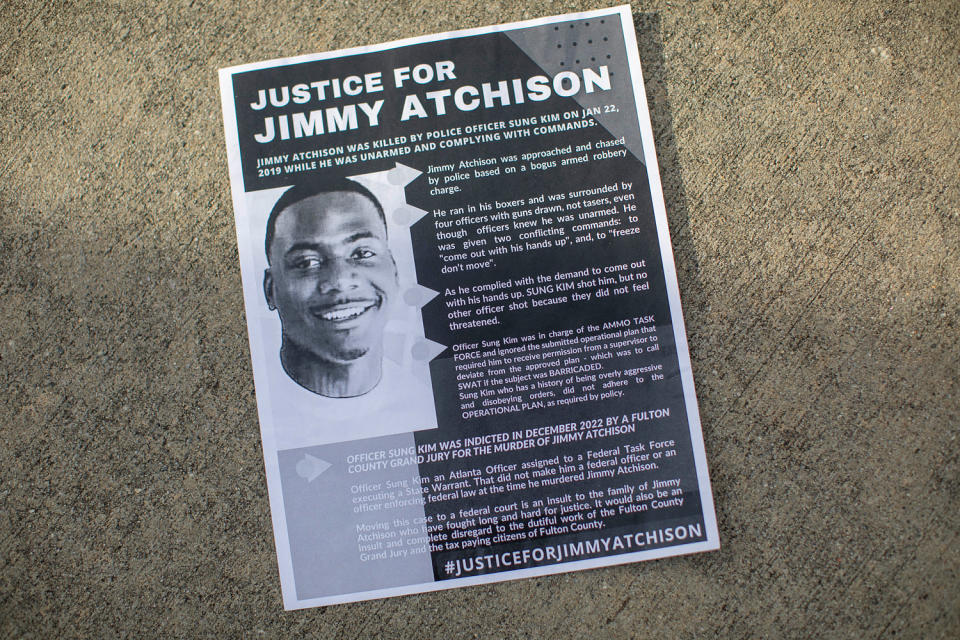
Atchison is one of at least 223 people shot by federal agents, task force officers or local police assisting in cases tied to Justice Department law enforcement agencies from 2018 to 2022, according to an analysis of court documents, law enforcement records and news accounts by NBC News.
During that period, local prosecutors, grand juries or law enforcement agencies deemed those shootings as justified 98% of the time. Of the 144 shooting reviews documented by NBC News, only two, including the Atchison case, resulted in criminal charges against on-duty officers.
Over the last three decades, a handful of local prosecutors have tried to convict federal agents or federal task force members of murder or manslaughter after fatal shootings. To date, no prosecutor has succeeded, according to a review of court cases on Thomson Reuters Westlaw.
Cases typically get moved to federal court, where they are more likely to be dismissed. Again and again, federal judges have dismissed charges by prosecutors, citing long-standing legal precedents.
In September, a federal judge moved Willis’ murder case against Kim from county court to federal court, where a federal judge is now presiding over it. Willis told NBC News that since then, family members of the victims and representatives from her office haven’t been treated well by Justice Department attorneys.
“That’s not an acceptable thing. They are treated very poorly when they are in that courtroom,” Willis said. “It has troubled me the way that the victims’ families and my prosecutors and investigators have been treated.”
Spokespeople for the Justice Department, the FBI and the U.S. Marshals declined to answer questions about specific cases. Donald Samuel, an attorney for Kim, who has retired from the Atlanta Police Department, declined to comment, as well.
Peter Carr, a spokesperson for the Justice Department, said in a statement that the department was proud of the work of its law enforcement officers. He added that it recognizes the importance of transparency and accountability and had recently updated its use-of-force policy.
“Because there are circumstances where the use of force may occur, we recently updated our policy to ensure it parallels the best practices of federal, state and local law enforcement,” Carr said.
Gerald Griggs, a civil rights attorney and the president of the Georgia chapter of the NAACP, said federal officials must do more. Griggs said he and other local activists are determined to use the Atchison and Robinson cases as a launchpad to ensure that federal officers are held to the same standard as local police.
“People didn’t understand that this is happening with federal officers. Everyone is focused on state and local officers,” he told NBC News. “We are litigating this issue and trying to change the law.”
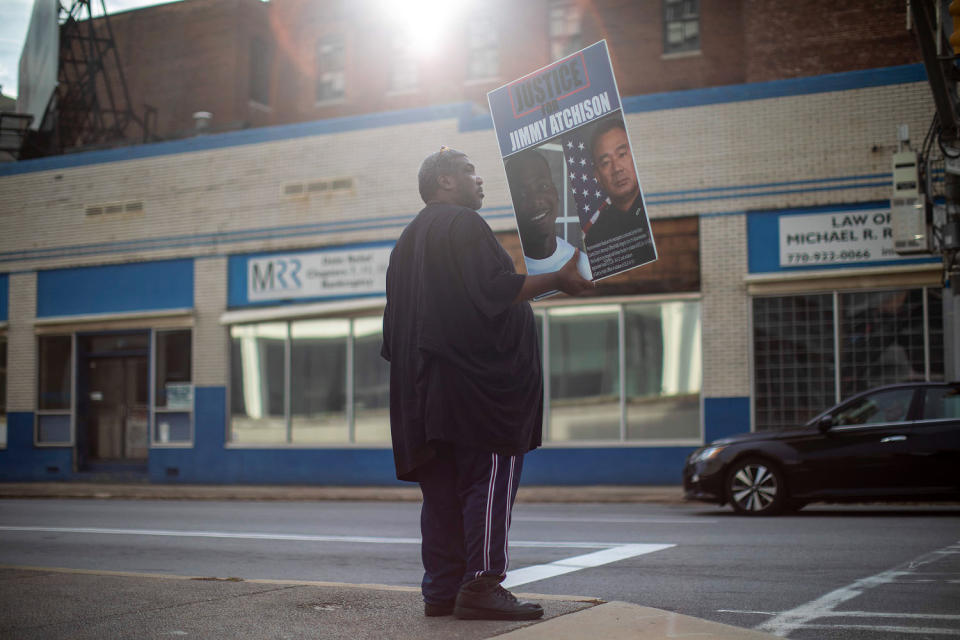
‘They’re saying that they’re immune from prosecution’
Four days after Christmas in 2018, a young woman told Atlanta police that Atchison, a friend of a friend, had pulled out a gun and stolen her handbag and cellphone, county records show. Atchison didn’t have any prior felony convictions. Still, the FBI’s Atlanta Metro Major Offender task force, which combines local police with federal agents, adopted the case.
On a cold January morning, the FBI-led task force raided Atchison’s girlfriend’s apartment. Atchison was asleep inside, as were his two young children. Local prosecutors say the FBI didn’t have a search warrant to enter the home. A foot chase ended inside a neighbor’s apartment with Atchison sitting in a bedroom closet under a pile of clothes. “I see you. Don’t f--king move,” Kim shouted, according to FBI documents. Covered in garments, Atchison moved his right hand. Kim shot him in the face.
“TFO Kim believed that Atchison was about to shoot him with a firearm,” an FBI investigator later wrote.
When Fulton County filed charges in Atchison’s case, his death became one of two cases in which criminal charges were filed against on-duty officers from 2018 to 2022 in an NBC News analysis of shootings involving Justice Department agencies.
In addition to the Atlanta case, in September 2022, prosecutors in Dane County, Wisconsin, charged a state law enforcement investigator with recklessly endangering safety by using a dangerous weapon.
The officer, Mark Wagner, who was working alongside agents with the Drug Enforcement Administration and other federal agencies, shot a 38-year-old unarmed Black man after officers boxed in his Hyundai SUV with their vehicles, according to court papers. The man, who survived the shooting, was wanted for violating state supervision after having sold drugs. Wagner told investigators that he thought the man had a gun.
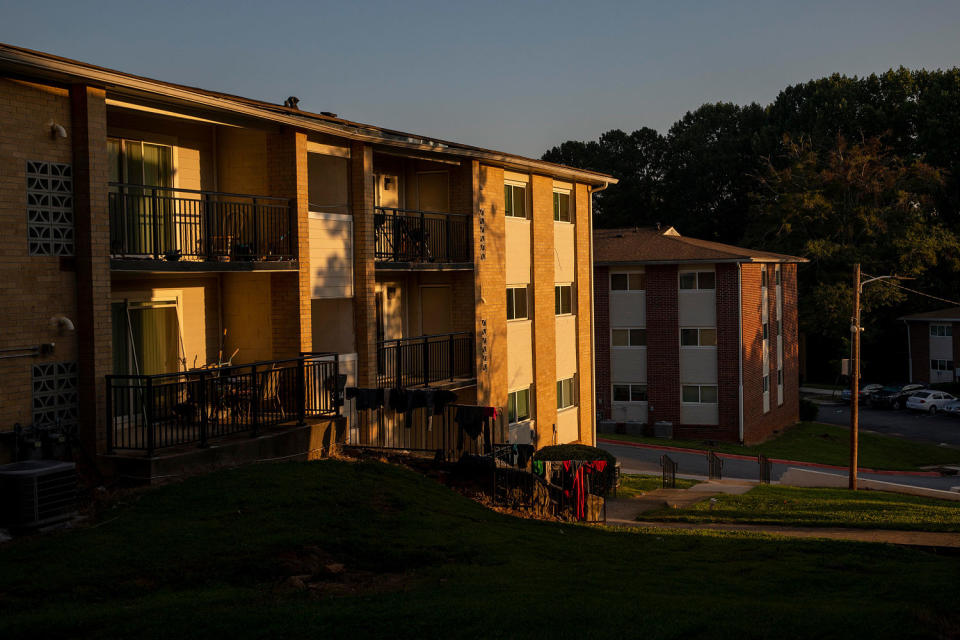
In Atlanta, Seleta Griffin, under Willis’ predecessor, led the Public Integrity Unit, which investigated police misconduct. She investigated Atchison’s death and the shooting of Jamarion Robinson.
In the Robinson investigation, which started in 2016, Griffin learned firsthand about the legal hurdles to prosecuting federal task force officers. For starters, when local officers join federal task forces, they are deputized with federal powers and protections. Members of the federal task force shot Robinson nearly 60 times while they were trying to serve a warrant, NBC News reported.
Officers said Robinson, 26, shot at them several times. The family denies that he fired, and his mother said she told law enforcement that Robinson had been diagnosed with schizophrenia.
Griffin learned that getting Justice Department law enforcement agencies and prosecutors to share case files and agency directives, along with granting interviews with federal agents and task force officers, was difficult.
Federal officials follow a 1951 U.S. Supreme Court decision, Touhy v. Ragen, that bars local law enforcement from getting subpoenaed information, testimony and other records about federal officers without permission from the Justice Department. Local prosecutors say the bureaucratic process, known as “Touhy Requests,” often drags on for months, slowing down their probes into potential abuse by federal law enforcement.
“It’s like the state versus the federal government,” Griffin said. The Fulton County DA’s office ultimately sued the Justice Department for access to files about the Robinson shooting. A federal judge ordered the Justice Department to pay the DA’s office more than $114,000 in attorneys’ fees and costs, court records show.
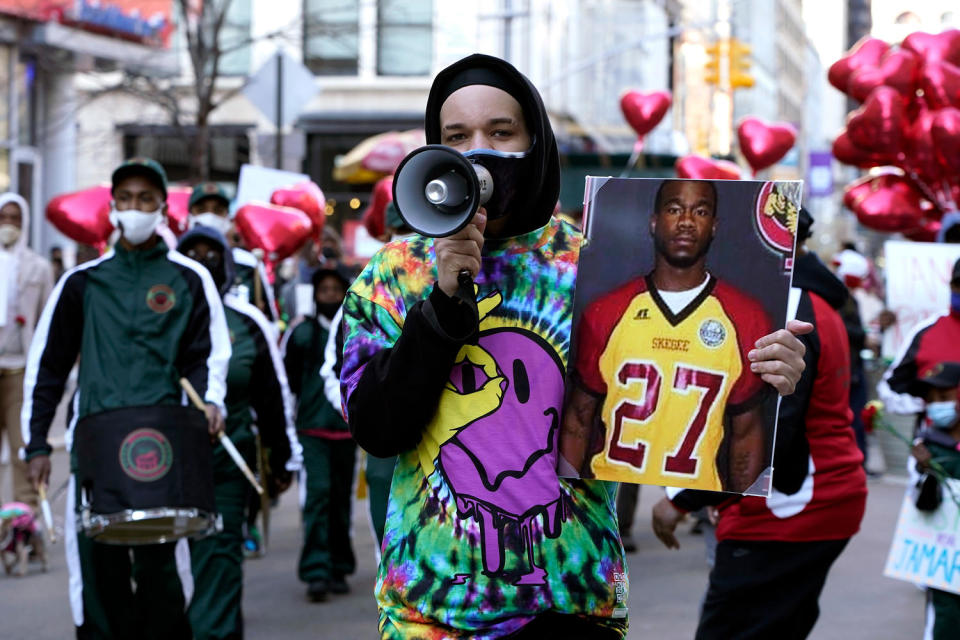
Griffin and other current and former prosecutors argue that their most formidable obstacle after they charge federal officers or task force members with local crimes is a passage of the Constitution that says federal law “shall be the supreme Law of the Land.” The U.S. Supreme Court has interpreted the provision, known as the Supremacy Clause, over the decades to mean states can’t interfere with the federal government’s police work.
“We can indict all day long,” Griffin said. “Once it’s in federal court, that’s where it gets dismissed. Because they’re saying that they’re immune from prosecution under federal protection.”
The legal argument traces back to the 19th century. During the War of 1812, Congress protected federal customs officers from local interference. Subsequent laws protect other federal officers from being sued or prosecuted on the local level.
In 1889, a deputy with the U.S. Marshals, David Neagle, shot and killed a man who had been harassing a U.S. Supreme Court justice on a train in California. A sheriff arrested Neagle for murder, and the nation’s highest court stepped in and ruled that state officials couldn’t jail Neagle for engaging in acts on behalf of the federal government.
More than 130 years later, federal officers still use the Neagle ruling to argue that local prosecutors can’t pursue criminal charges against federal law enforcement, and usually federal judges agree.
Under current federal law, officers can ask federal judges to transfer their cases from the state level into the federal court system, where, under the Supremacy Clause, federal judges often throw out charges brought by local prosecutors.
That tangle of protections has made it all but impossible to stop federal courts from shielding federal officers from legal repercussions, experts say. And the protections extend to local officers who are formally deputized as members of federal task forces.
“Is the fix to have the feds not defend the federal task force? Well, that won’t happen,” said Daniel Richman, a former federal prosecutor who is now a professor at Columbia Law School. “The federal government takes all its equities into account, and those equities include protecting agents from what it thinks might be improper prosecutions.”
When Griffin became the supervisor of the Public Integrity Unit in 2019, Atchison’s death was the first new case to come across her desk. After her unit completed its investigation into the federal task forces that shot both Robinson and Atchison, Covid hit. Her office could no longer convene grand juries, and the indictments stalled.
In 2020, Fani Willis, a former prosecutor in the district attorney’s office and a magistrate judge, unseated a six-term incumbent. Willis, who secured the endorsement of the Atlanta police union, won the election after having campaigned to clear a backlog of police misconduct cases and fight corruption.
After she took office, Willis took over the Robinson and Atchison cases, presented them to grand juries and secured indictments against three officers involved in the shootings. Sung Kim, who shot Atchison, was charged with felony murder and involuntary manslaughter in December 2022.
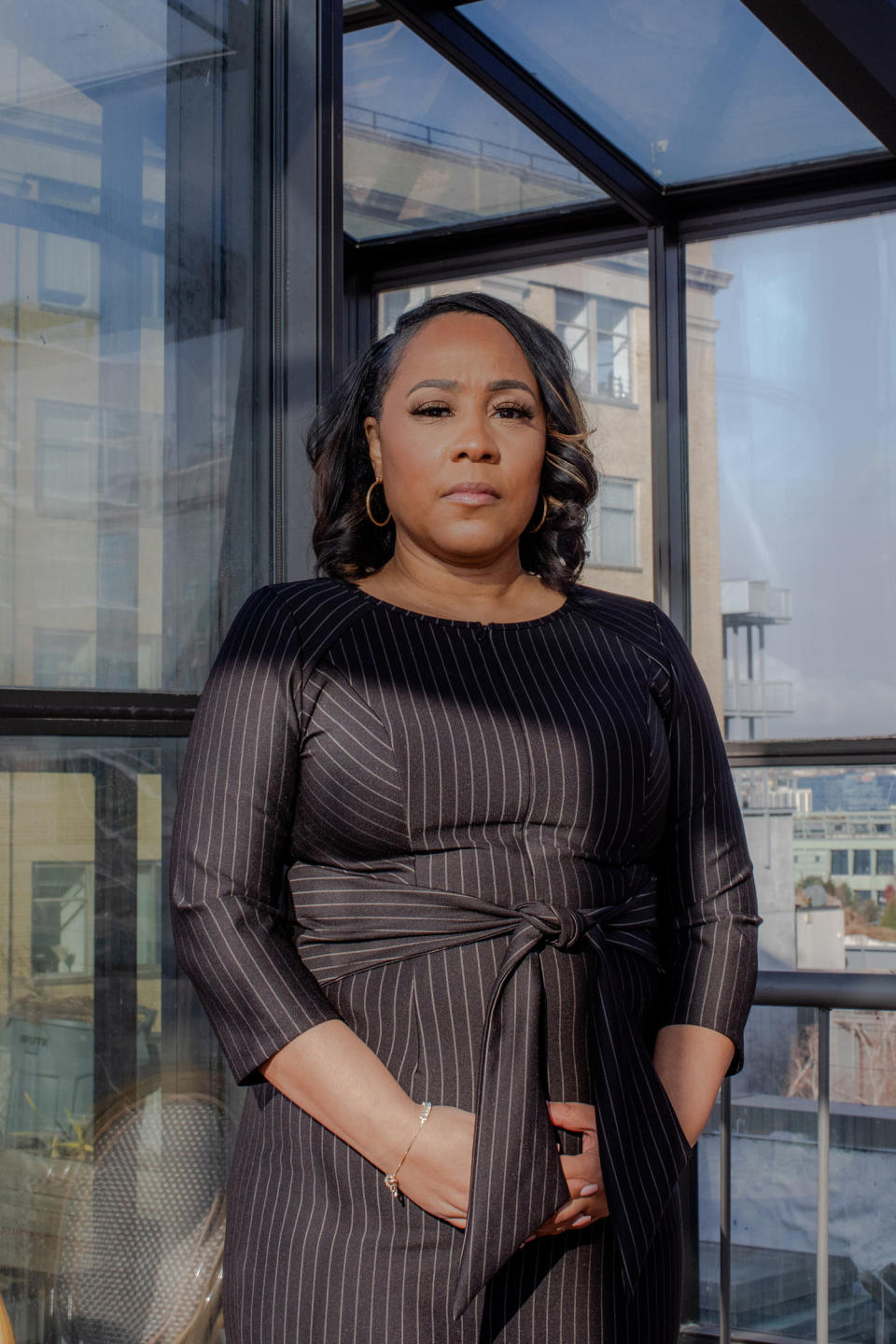
‘They look after their own’
The issue extends beyond legal precedents. Current and former prosecutors who have tried to prosecute federal officers say they are outmatched by the sheer number of lawyers the Justice Department can muster.
“There were 10 lawyers on their side against just me,” recalled Denise Woodbury, a former Idaho prosecutor who charged an FBI sniper with involuntary manslaughter after he mistakenly shot and killed a suspect’s wife during a standoff in Ruby Ridge in 1992. The case became infamous among far-right militia members.
A federal judge, citing the Supremacy Clause, ruled that the FBI agent was immune from state prosecution. “They look after their own, rather than look for justice,” Woodbury said.
A federal appeals court later ruled that the state could reopen the case, but Woodbury’s successor declined to do so.
In 2014, the district attorney’s office in Austin, Texas, charged an FBI task force officer named Charles Kleinert with manslaughter. Kleinert was at a bank investigating a robbery in 2013 when Larry Jackson approached employees, gave a false identity and asked to withdraw cash.
Kleinert began to question Jackson, who ran away. When he caught up to Jackson, a physical struggle ended with Kleinert shooting Jackson in the neck. Kleinert says he fired his weapon accidentally.
The local district attorney charged Kleinert, an Austin police detective who was a deputized member of a FBI federal task force at the time, with murder. U.S. District Judge Lee Yeakel, citing the Supremacy Clause, dismissed the charges. The district attorney’s office appealed the case up to the Supreme Court, which declined to hear it.
Yeakel, now an attorney in private practice, told NBC News that by declining to take the Kleinert case, the Supreme Court has yet to answer whether Supremacy Clause protections apply to local police officers on federal task forces.
“They could leave Neagle in place but say the protections afforded are for a purely federal officer performing purely federal officer duties,” Yeakel said. “They can restrict the Supremacy Clause immunity.”
More recently, a federal judge stopped prosecutors in Virginia from pursuing a state involuntary manslaughter case in 2021 against two officers with the U.S. Park Police. The officers chased a car whose driver fled a nonfatal hit-and-run. The chase ended with officers shooting and killing the motorist.
Steve Descano, the local prosecutor, said he tried to prosecute the Park Police officers despite warnings from the Justice Department that his effort would prove fruitless.
“The Department of Justice would not allow FBI agents and the investigators in their case to be part of our case,” Descano said. “It was basically a dead letter to us.”
NBC News found that federal prosecutors failed to charge any federal agents or task force officers for shootings that occurred from 2018 to 2022. Local prosecutors, during the same period, charged 79 state and local officers with murder or manslaughter after on-duty shootings, according to Philip Stinson, a criminal justice professor at Bowling Green State University who tracks nonfederal officers charged with crimes.
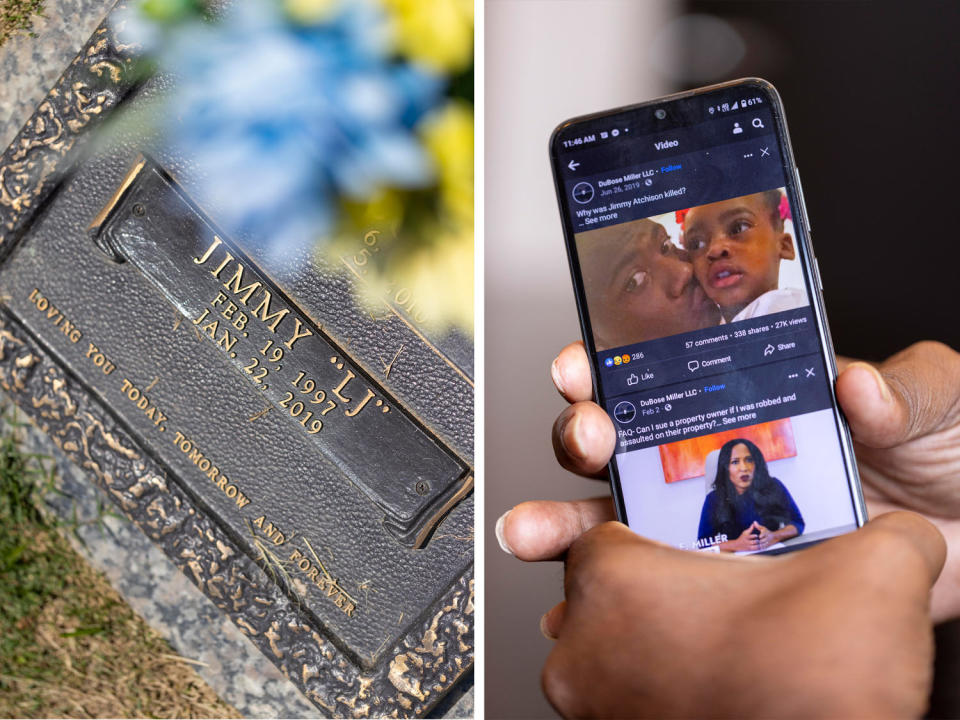
Former federal prosecutors said state prosecutors handle murder or manslaughter cases, unless there are connections to a federal crime, such as the murder of a federal officer.
“You can’t just say: ‘I hate that this agent assaulted or killed somebody. So I’m going to open a federal case,’” said Joyce Vance, an NBC News legal analyst who was the U.S. attorney for Northern Alabama during the Obama administration. “That’s not how it works.”
‘I am trying to get this global’
Now that former officer Sung Kim’s murder case has been moved to federal court, past decisions suggest it will be dismissed. The murder case Fulton County prosecutors filed against officers who killed Jamarion Robinson is still alive, but similarly endangered.
The case is believed to be the first in which an agent with the U.S. Marshals has been charged for a fatal on-duty shooting. Eric Heinze, an assistant chief inspector and a high-ranking officer with the U.S. Marshals, remains on the job. A federal judge moved the case to federal court, where the judge has yet to rule on whether the officers can be prosecuted.
Monteria Robinson, Jamarion’s mother, remains hopeful the federal judge will let the case go forward.
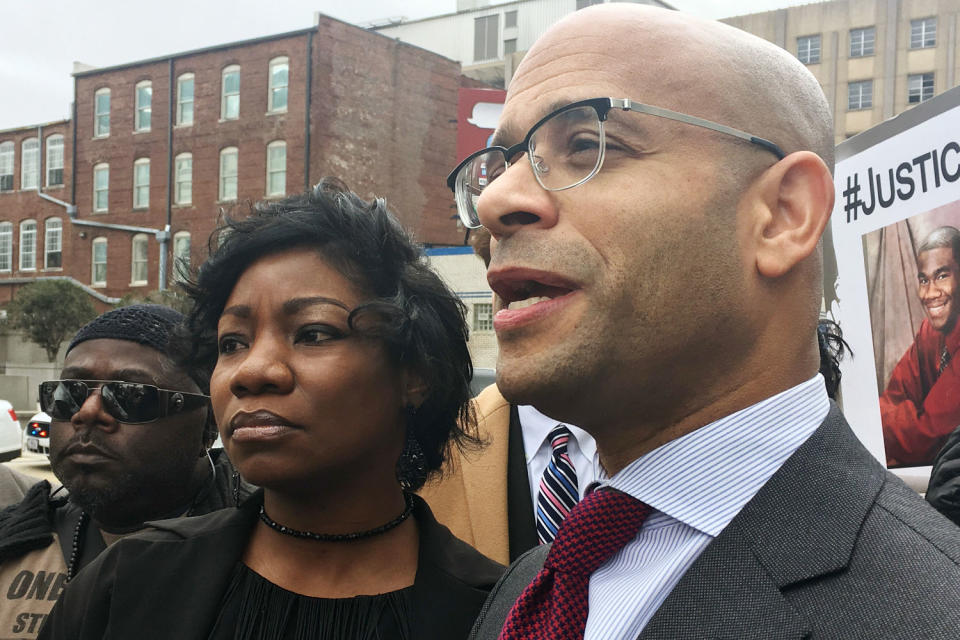
“The law enforcement officers that killed my son must be convicted, sentenced and sent to prison to serve their time just like any other citizen in this country who commits murder,” she said.
Lance LoRusso, an attorney for Heinze, argued that officers on federal task forces have a constitutional right to have local charges filed against them moved to federal court.
“It’s not any harder to prosecute federal officers. You just have to do it in federal court,” LoRusso said. “It’s a basic concept of federalism.”
Willis said that, after her office indicted members of the U.S. Marshals task force, the federal agency rolled back its fugitive investigations in the Atlanta area. “I think it’s shameful,” Willis said. “I take it as a situation that could make citizens less safe.”
Court filings by Willis’ office say the U.S. Marshals task force didn’t have the authority to arrest Robinson on state crimes. The U.S Marshals consider those legal filings substantiation of an unwillingness to acknowledge their legal authority to execute state warrants, federal officials say. As a result, they say, marshals now fear that local prosecutors will charge them for simply helping local police do their jobs.
Drew Wade, a spokesman for the U.S. Marshals, said the agency’s “fugitive investigations are based on our statutory mission to safely bring offenders to justice under the law.”
In Atchison’s case, Kim’s lawyer argues that he shouldn’t face murder charges because he is protected by both the Supremacy Clause and the state self-defense law. A trial date for Kim hasn’t been set.
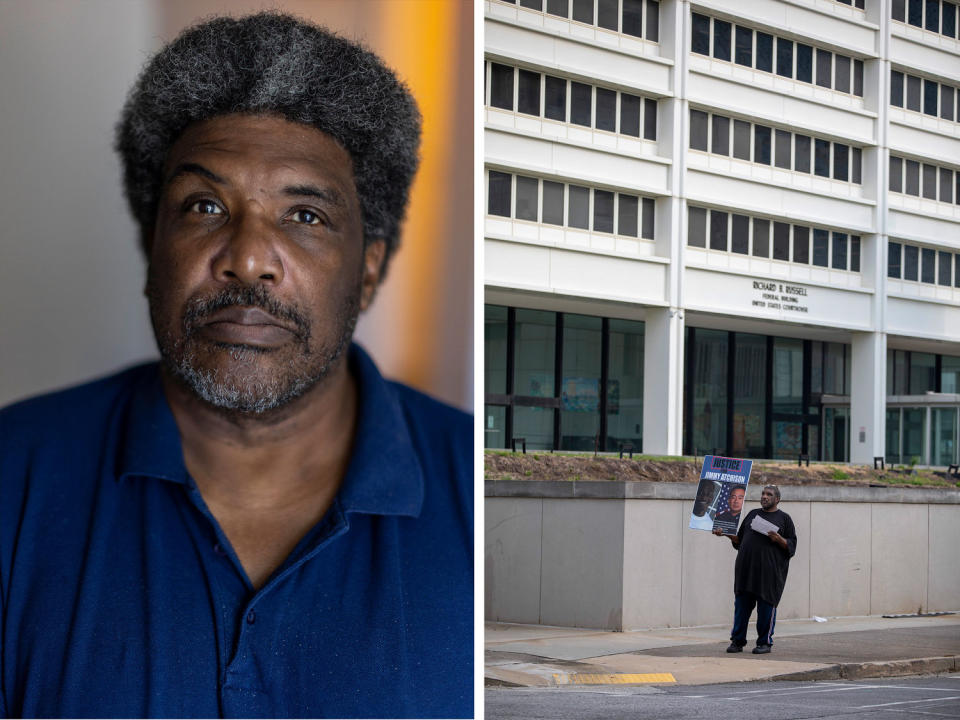
The legal developments haven’t deterred Atchison’s father, Jimmy Hill, from holding protests at the federal and Fulton County courthouses, where he hands out flyers about his son’s death. “I am trying to get this global. I am tired of seeing people hurt,” said Hill, 61.
“My son wasn’t a terrorist. He wasn’t a flight risk. He didn’t fit the criteria as to why the FBI would be involved,” Hill said.
Hill’s activism has attracted a variety of civil rights heavyweights. He and his family have met with the NAACP, the Southern Center for Human Rights and a United Nations delegation, along with various elected officials.
Their message is simple: “Even though they’re working on the federal task force, they still don’t have the right to just kill somebody,” said Tammie Featherstone, Atchison’s aunt.
Willis would like to see federal law enforcement agencies enact multiple reforms. She questioned why federal agencies and task forces still aren’t wearing body cameras at all times.
“Another difficulty in prosecuting [is] when you have federal agents running around without bodycams, making it more difficult to know the facts or ascertain the facts about the case,” she said.
Willis also called for reforms that would allow people accused of local crimes whose cases have been moved into federal courts to have them heard by local juries instead of federal ones. In Atchison’s case, that would be the difference between a jury of Atlanta-area residents and one made up of people from across the northern half of the state.
“I am hopeful that we will still get fair results,” Willis said.
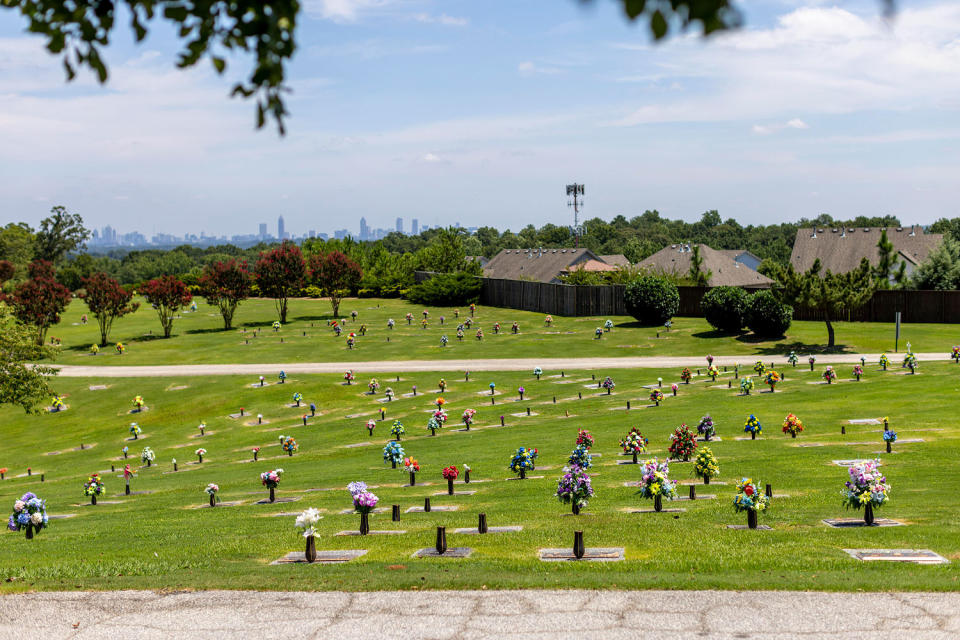
This article was originally published on NBCNews.com

